With the onset of winter, we welcome the misty mornings and chilly evenings, but it comes with its own set of woes. And, hot water is the bare necessity during this time of the year.
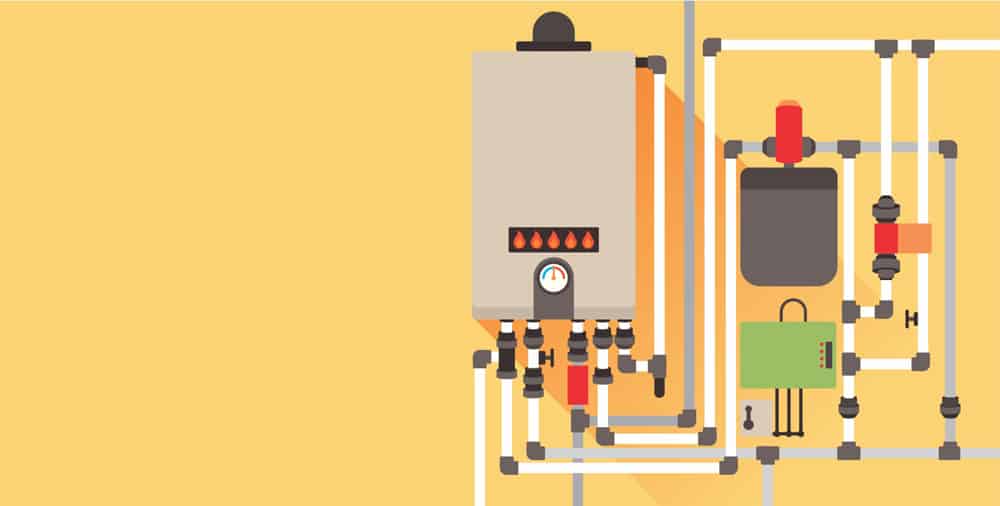
What is the breakthrough invention for home appliances? Without a blink, it’s none other than the most hardworking device in every home - a water heater. It was before the invention of this heating system that we used the open fire or the stove for making hot water. This was indeed a time-consuming affair back then, but water heaters are simple, safe, and convenient to use today.
At present, you'll find a wide variety of water heating systems in the market, with apparent distinctive features. This is how far, innovation has come to help make our daily lives simpler.
However, you’ll face quite a few challenges as you look for the right water-heating appliance for your home. We’ve compiled the best types of water heaters in the following guide to help you make a fully-informed decision!
Types of Water Heaters
-
Tankless Water Heater
The “tankless” water heater comes with a modern technology feature that gives your home an endless amount of hot water.
How does the tankless water heater function?
As the name suggests, the “Tankless” water heater comes without any tank. It has coils that get super-heated when filled with water. This helps to heat the water in an instant, no wonder it’s called the on-demand water heater. If you have a large family, then this product will be perfect for water heating purposes. It can heat a large amount of water quite efficiently.
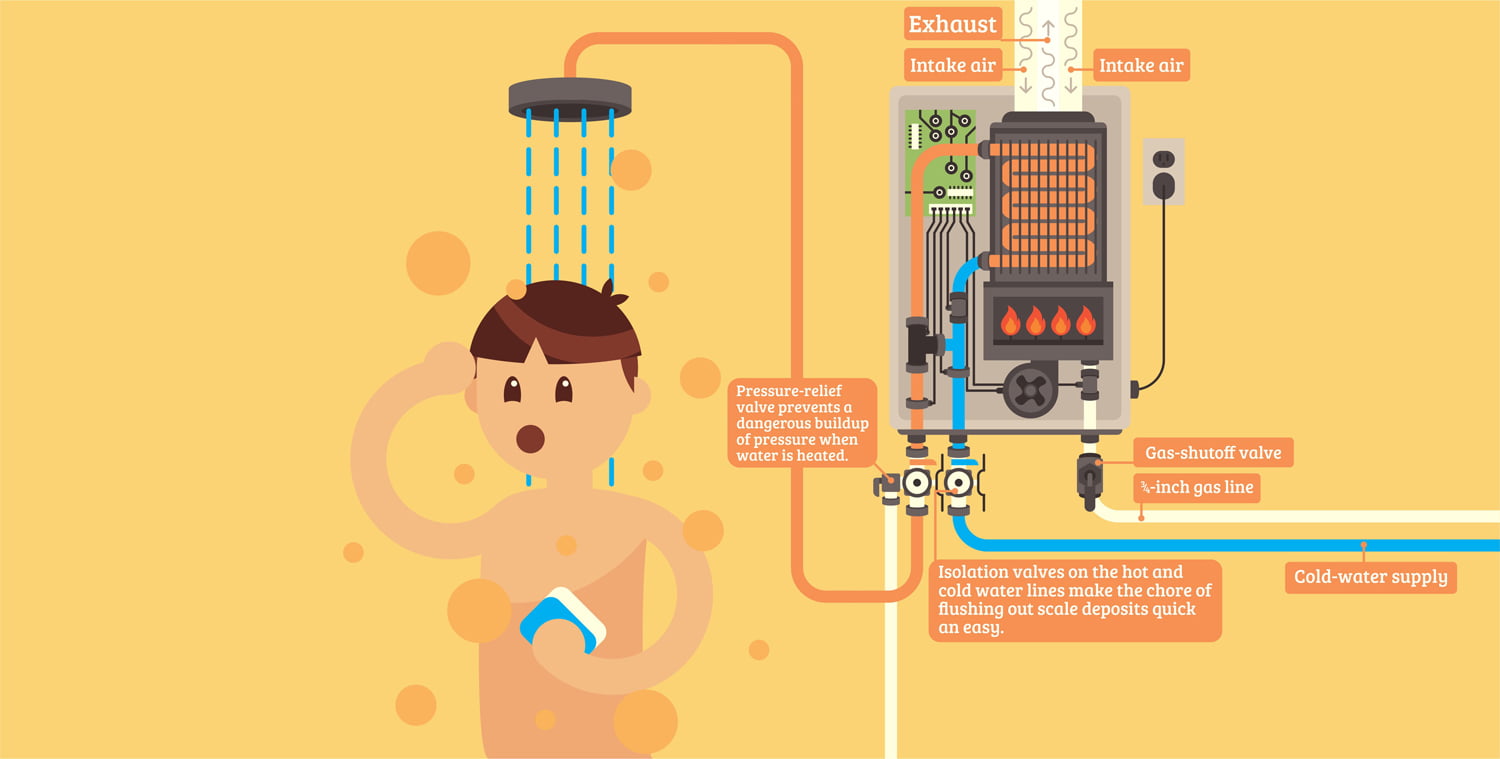
Illustration by Doug Adams
The “Tankless” water heater is available in different sizes. So, you should be careful about selecting the appropriate size as per the needs of your family. For instance, if you choose a small water heater and the demand for it is huge, then you can expect to get cold or lukewarm water.
With the smaller water heater, you have the option to use natural gas to power the heater. But, if you’re opting for the larger size, you’ll need a gas line with a large quantity of gas to help the water heater function right.
However, for the larger models which run on electricity, you’ll need to increase the electrical capacity of your home. This can get expensive, mainly if the water heater is used frequently.
What type of maintenance is required?
Even your “Tankless” water heater will require some basic maintenance. You should get it cleaned at least once a year to avoid corrosion by removing the mineral scale deposits. You might find the parts of this heater to be pretty small which makes it more challenging to clean. If you can maintain this heater correctly, it will last you anywhere between 8 to 10 years.
What are the positive aspects of this water heater when compared to the other models?
If you’re looking to reduce your energy consumption, we advise you to get the “Tankless” water heater. The main reason people usually opt for this “tankless” model, is due to its on-demand feature, which gives you warm water in a flash when you need it.
And, if you get one of the large “Tankless” models for your home, you have the privilege of getting hot water throughout the day.
What are the negative aspects of the Tankless Water Heater?
The down payment for this model is much higher than the other conventional-style water heaters. Few of these models also require larger electricity capacity and gas lines that will be an additional cost for the entire renovation.
-
Traditional Storage Tank Water Heater
In most homes, you’ll find this conventional-style water heater, that makes you quite familiar with the model we’re about to describe. However, let’s look at the details of this product!
How does the conventional storage-tank water heater function?
In this style of water heater, you’ll get the storage tank feature, for storing water that needs to be heated. This indicates that the size of the water tank helps to determine the quantity of hot water available for you at once. The tanks come with proper insulation for keeping the water warm after you have turned on the heater.
The heater comes with a two-valve feature; one is for controlling the temperature while the other is for pressure control. The pressure control valve opens only when it needs to release heat and for moderating the temperature level after the water records 120 degrees Fahrenheit. And, the valve for pressure control opens for reducing the pressure after it reaches around 150 Psi.
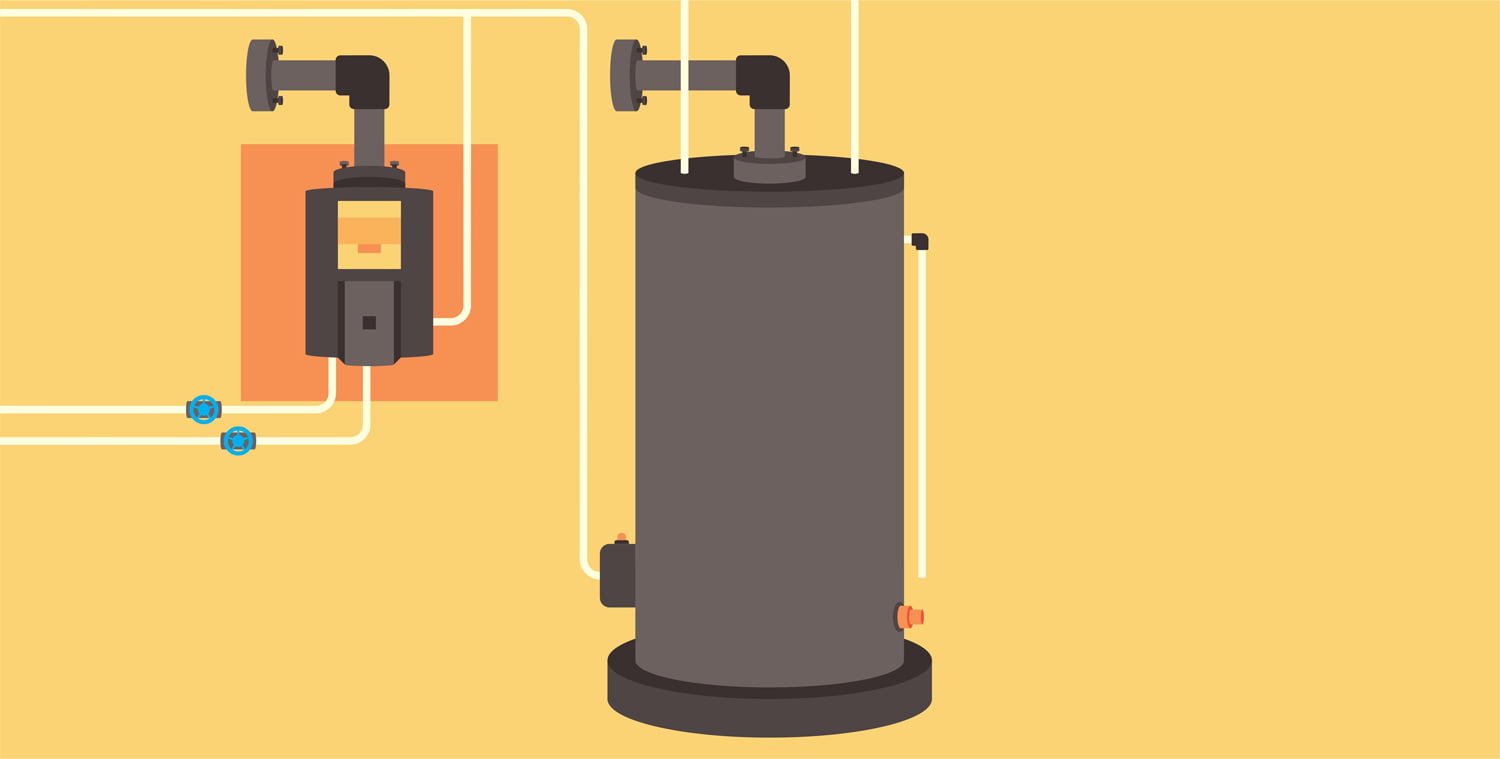
This is the most popular type of water heater that is available in almost every household. But, it does have limitations for the amount of water that it can hold. You might face some challenges if you’re purchasing a small tank for a household that generally requires a large quantity of water. For instance, you’ll have to wait for another new tank to be heated each time you run out of hot water.
What kind of maintenance is required for the traditional storage-tank water heater?
This water heater tends to work continuously for storing water, which makes it essential for you to clean the tank quite often. It will not just prevent corrosion but also enhance the lifespan of the water heater. You need to ensure that the tank is cleaned at least twice a year to remove the mineral scale deposits and other sediments.
If you don’t focus on the maintenance aspects, then the water heater will not last for an extended period. However, the Traditional Storage Water Tank Heater usually comes with a lifespan of around 10 to 12 years.
What are the advantages of this type of water heater?
This traditional Storage Tank Water Heater is one of the most affordable styles that you can find along with a simple installation process.
What are the drawbacks to purchasing a Traditional Storage Tank Water Heater?
This model of water heater, it has a fixed amount of water that it can store. For instance, a tank with a 50-gallon water capacity will offer you the same quantity of constant water flow until the tank is empty. After you run out of hot water, it may take around an hour or more to refill the tank and to heat another 40 gallons of water.
-
Condensing Water Heater
This water heater has a smart solution, which makes it energy efficient. It utilizes the extra gas fumes in your home by capturing it for heating the water.
How does the Condensing Water Heater function?
This is also known as the condensing boiler. If you're using natural gas as a primary source of energy at home, then the Condensing Water Heater is one of the best options available. This water heater is energy efficient as it can extract energy out of the flue gas and then stores this heat for pre-heating the water which enters the boiler.
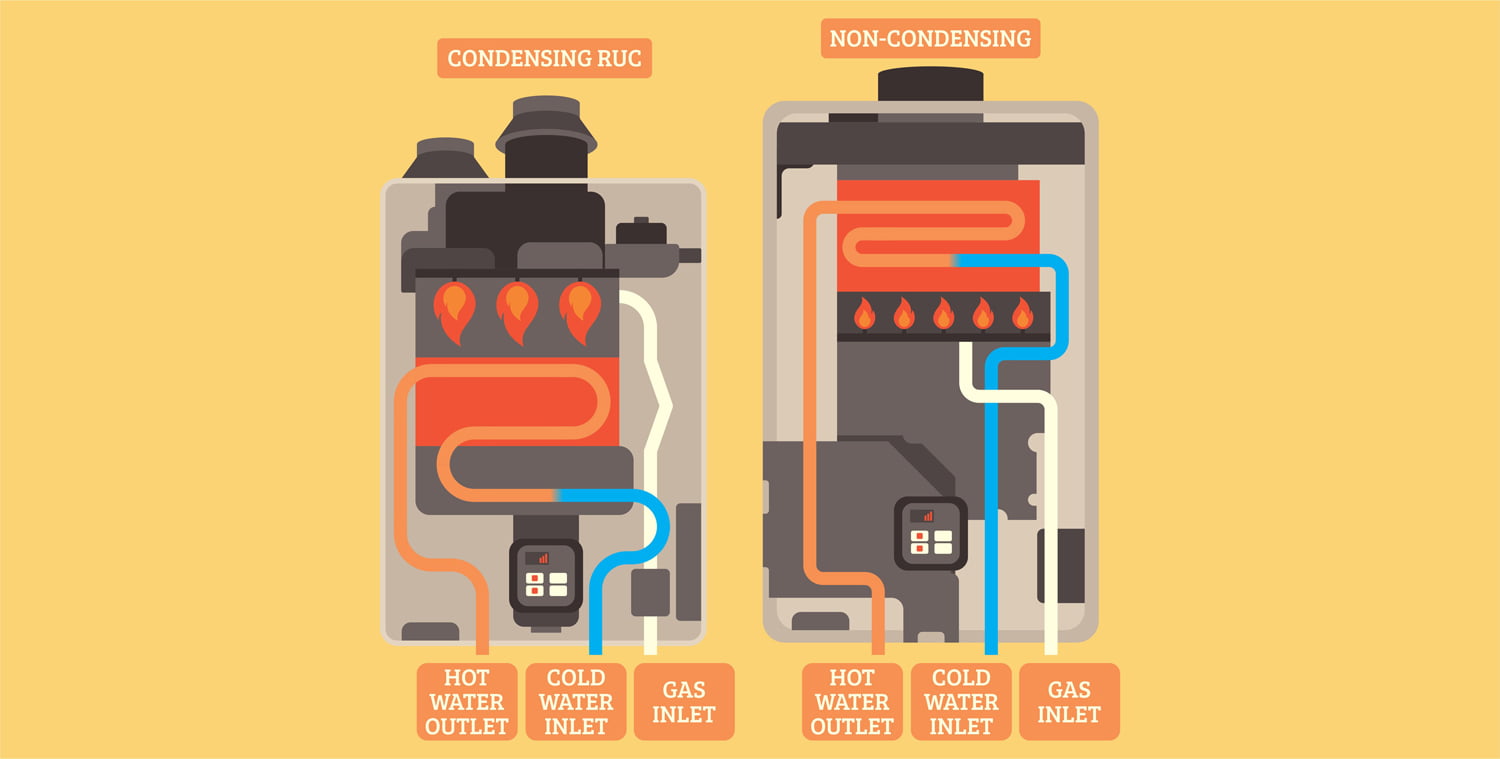
It has a tank just like other traditional storage-tank water heaters. But, it captures the hot exhaust gas that is generally expelled from the house through the flue. These gases are then blown from the coil which is placed at the base of the heater. It is located at the bottom, to heat the incoming cold water. This design of the water heater is suitable for a household that requires around 55 gallons of hot water or more.
This Condensing Water Heater requires quite a less amount of energy when compared to other styles of water heaters. But, you should purchase the appropriate size with a large capacity according to the needs of your family.
What are the types of maintenance required for this style of water heater?
This model also comes with a tank, just like the other water heaters. So, you should ensure that you get the tank cleaned at least once a year. And, the same goes for the gas import valves that should be maintained well.
What are the advantages of using this kind of water heater?
For households that use natural gas, this style of water heater is indeed the most energy-efficient option. You’ll get plenty of hot water as this model comes with a big tank, so there is no fear of the water running out anytime soon.
What are the disadvantages of this style of water heater?
You’ll not find a small-size tank for this model, but it works perfectly fine for families that require a quantity of 55 gallons of water or more. However, this style of water heater is not a great alternative when compared to the Conventional Style Storage Tank Water Heater. Especially for homes that don’t require natural gas for other purposes.
-
Heat Pump Water Heaters
Heat Pump Water Heaters are also known as Hybrid Electric Water Heaters. You’ll not be spending much money on your electricity bills since it doesn’t generate heat directly leading to lower consumption of power.
How does the Heat Pump Water Heater function?
This style of water heater comes with a unique mechanism. It captures heat from either the ground or air, and then gradually transfers the heat to the water. This shows that the electricity is in use only when the heat moves from the air or ground to the water tank. It's unlike the other models, where the machine depends entirely on electricity to operate.
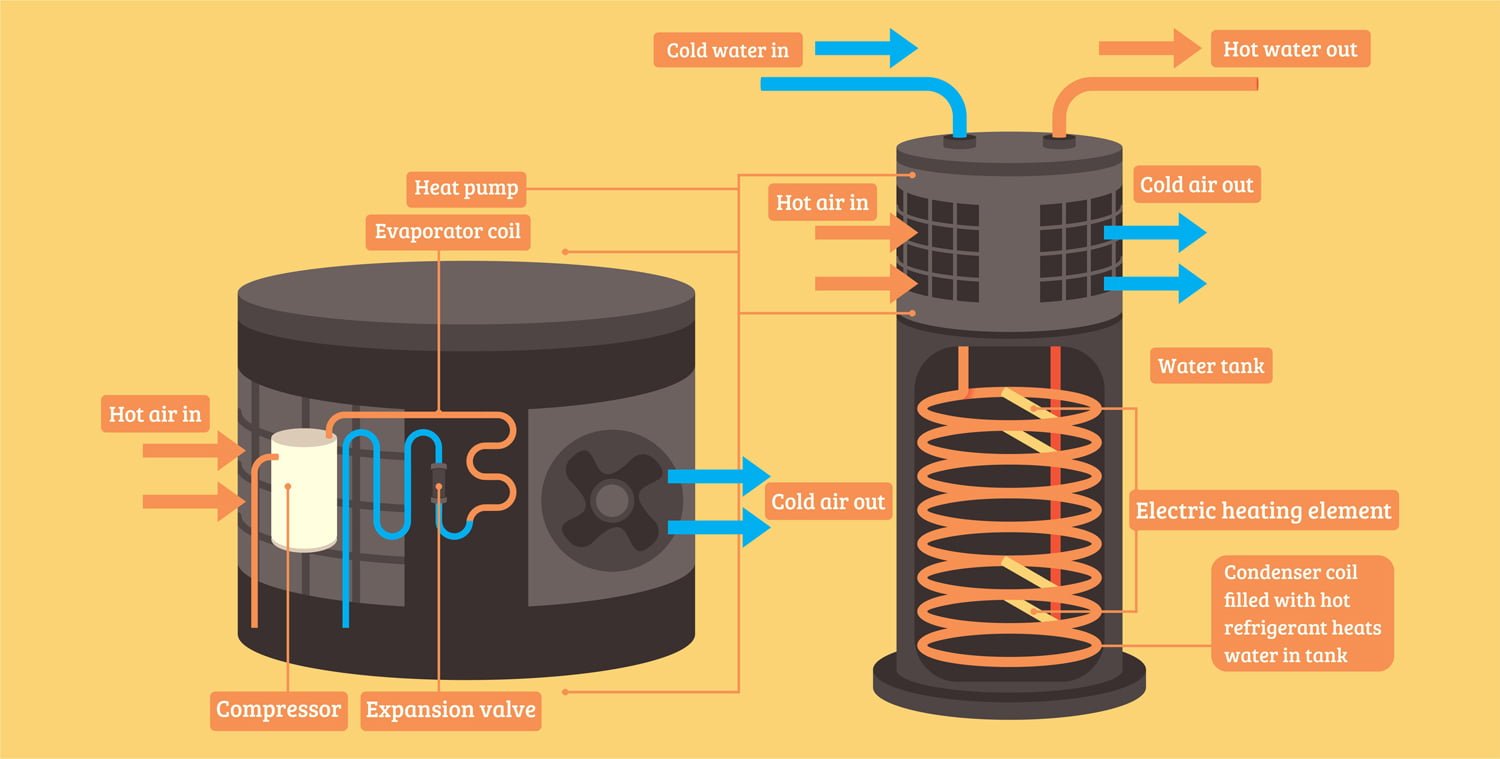
It consumes around 60% less energy when compared to the conventional style of a water heater. However, the heat pump is placed on top of the water heater so you'll need around 8 feet of open space from the floor to your ceiling.
What kind of maintenance is involved in this water heater?
Just like the traditional storage tank water heaters, this model also comes with a tank, which means that it should be cleaned regularly. And, when you get the general inspection and cleaning done at least twice a year, it helps the water heater to function efficiently.
What are the positive aspects behind the usage of hybrid/pump water heaters?
This model of water heater is extremely energy efficient, which means you can expect a return on investment with lower utility bills.
What are the pitfalls of this type of water heater?
The Hybrid Electric Water Heater doesn’t function efficiently in places with extremely low temperatures. This is because it depends mainly on drawing heat from the air or ground that is around it. We don’t advise you to place this heater in your basement or in places where it’s freezing throughout the year. Finally, this model of water heater is one of the most expensive pieces available.
-
Solar Powered Water Heater
A water heater that is solar-powered draws its energy from the sun. If you’re considering adding solar panels, or you already have them installed at home then this style will be the absolute best option for you.
How does the Solar Powered Water Heater function?
If you’re looking for a highly energy-efficient model of water heater, the Solar Powered Water Heater will be suitable for you amongst all the other styles. It relies on solar panels for energy sources which are usually mounted on the roof.
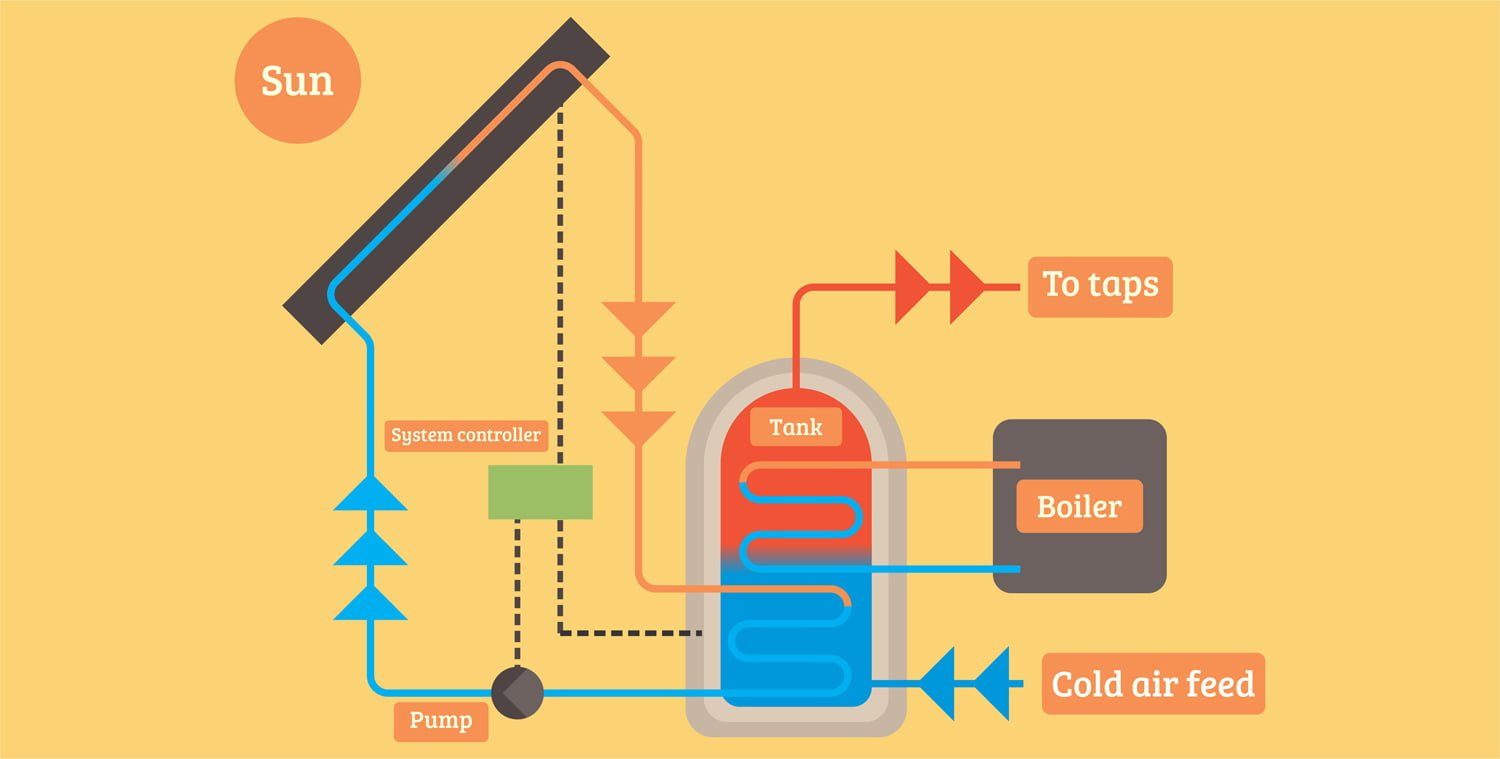
The solar energy trapped in the cells of the solar panels is slowly transferred to the closed-loop system, which contains the heat-conductive material (antifreeze-like fluid). This antifreeze-like fluid then runs to heat the water in your tank.
The Solar Powered Water Heater works great for people who are living in warm, sunny climates, as it can save a ton of money on electricity bills. Overall, you’ll also require to have an alternative energy source, such as electricity or natural gas, to operate the water heater during the cold and rainy season.
What kind of maintenance is required?
This system also comes with a tank, that should be cleaned at least twice a year to remove the mineral deposits and for preventing corrosion. You also need to maintain the solar panels, which might require an annual professional inspection.
What are the benefits of using a Solar Powered Water Heater?
It is an environmentally friendly water heater as you’ll be reducing the hot water carbon footprint. This is an incredibly energy-efficient style of water heater that turns around 80% of the radiation into heat energy. And, by installing the solar-powered heater, you can save money on electricity bills every month. You can get an unlimited amount of hot water during the sunny days.
In some countries, the government also gives financial incentives if you start using solar-powered water heater which includes- federal and state tax credits, along with utility rebates.
What are the drawbacks to this style of water heater?
The entire set that comes along with this water heater can get pretty expensive in some regions. It might take around 20 to 30 years or more to yield a good return on your investment.
It is not suitable for all weather conditions as you need to depend on the sun to heat the water. However, when you have to get an alternative energy source, it just adds to the overall budget. Also, the annual maintenance of the various parts of the solar water heater can be a hassle.
-
Combined Space and Water Heating System
The Combined Space and Water Heating are appropriate for homes with lower heating requirements. This is due to lowered air leakage, more insulation, and efficient use of the space. With these systems, you need a single heating unit for your domestic water heating and space; this helps to save a significant amount of energy.
What is a Combined Space and Water Heating System?
It is also known as the “combi” system, which can easily replace the existing water heater and the forced-air furnace. This system consists of an optimized hydronic air handler and a high-efficiency boiler or water heater. The air handlers have been designed with large coils that help with heat transfer for an efficient method of space heating.
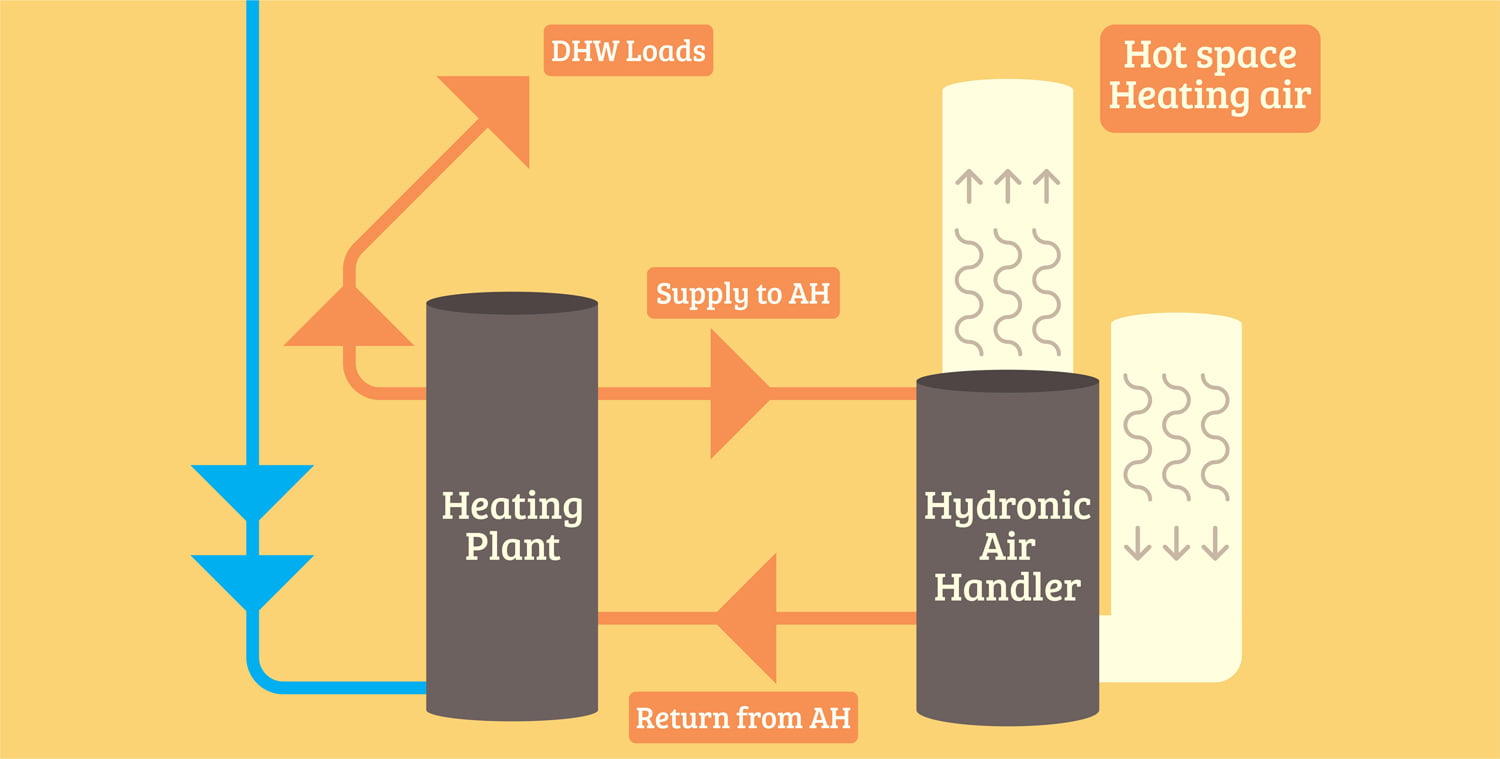
The fan coil is generally installed with ductwork, while the small pump helps to circulate water from your water heater along with the fan coil. If you want floor or radiant heating, you can distribute the hot water through the in-floor piping.
When you’re purchasing the water heater, you should be careful about the size to ensure that it can serve combined heating purposes. The functions of this system are different when it’s used for heating water in addition to space heating. Similarly, the performance rating of the space heater should not be used to measure its performance as a water heater.
How to maintain this heating system?
With preventive maintenance of the entire heating system, there are several benefits such as- longer equipment life, fewer repairs, lower energy bills, few chances of catastrophic breakdown, and safer equipment operation. You should hire a professional at least twice a year for general inspection and cleaning purposes.
What are the benefits of using a Combined Space and Water Heating System?
The “combi” system has the same gas consumption level when compared with separate high-efficiency water heaters and natural gas furnaces. It saves a good amount of energy and money by not having to purchase separate space and water heating devices. Moreover, this system eliminates spillage issues from the natural draft appliance with the use of a direct or powered combustion vent.
What are the negative aspects of this space-water heating system?
The initial investment for this product can get relatively expensive. And the installation process is quite challenging, as many installers are not familiar with this system. Therefore, we cannot compare this heating system with the standard installation methods for power vents or condensing furnace water heaters.
-
Combined Space and Water Heating System with a Hydronic Boiler
This combination space-water heating device has a hydronic boiler instead of a water heater. It’s a compact, energy-efficient option for a household that is aiming to save energy and reduce the number of necessary appliances. These systems come in different models for some, you can heat your space and water simultaneously, while for others heating space and water can be done one at a time.
What is a Combined Space-Water Heating System with a Hydronic Boiler?
This type of water heating device is also known as the segregated heating system or combi-boiler. It uses a hydronic boiler, from which the heat is generally transferred to the water through a heat exchanger. In some countries, there are rules which state the use of double-wall heat exchangers for such heating applications. It helps to avoid the contamination of potable water from your boiler heating loops.
You can find new combination boiler designs which have full-energy saving power along with a tankless feature. This helps to ensure that there isn’t any unnecessary water heating when you’re not around.
Moreover, it also comes with a flow control valve which ensures a constant temperature level irrespective of your incoming water temperature. You can, therefore, enjoy a good quantity of hot water flow with accurate water stability.
What maintenance is required for this heating system?
Again, you have to get annual cleaning and general inspection done for the boiler to work efficiently. The auxiliary pump connections and flow control valve should be maintained correctly to prevent it from mineral deposits and corrosion.
What are the benefits?
The life span for this heating system is around 10 to 15 years, depending on the maintenance and usage. It has a compact design with built-in parts for outdoor reset control, auxiliary pump connections, and recirculation capability. Therefore, it minimizes the number of products that you need to purchase separately for each function.
When you have this heating, the compact size also helps to free up the loft or roof space that is otherwise used for cold water storage in traditional heaters. This is because the combi-boilers get their water supply directly from the mains without the use of any tank. It’s a highly efficient heating system, and you’ll have around 90% savings from your monthly electricity bills.
Are there any negative aspects to this style?
It has a complicated installation procedure as it requires various electronic devices for its functions. You should ensure that a professional does the setup correctly because the repairing cost of a boiler is quite expensive.
This heating system might not be suitable for larger households with a high demand for hot water. As these boilers directly get their water supply from the mains, and it doesn’t have any backup of a water tank. Therefore, it requires more time to heat the water, and big families should instead opt for the traditional boiler that comes along with a water tank.
Features to Consider When Purchasing a Water Heater
-
Warranty
The general coverage for water heaters varies as per the cost and duration. But, the life span usually ranges from three to twelve years. You might have to pay a bit more if you want a longer-warranty period. However, we advise you to pay that extra amount to get a load off your shoulder without having to surprise yourself with more repair costs in the future.
You might also get a few models of water heaters that come with 13-15 years of warranty. And, they tend to have larger burners or other elements which can speed up the heating process. Also, it might have good insulation that prevents heat loss and saves up on energy.
-
Glass-Lined Tanks
Some water heaters are designed with a glass lining ( porcelain enamel ) inside them. Most of our water heaters are made up of steel, but with a coating of porcelain enamel, it helps to protect the interiors from corrosion. These days, ceramic enamel coating is also becoming widely popular. However, a glass lining is not a necessity in a water heater, but it helps to reduce the corrosion level that extends the life of the water heater in return.
-
Anti-Scale Devices
The buildup of mineral scale can damage the water heater to a great extent. Few brands have water heaters with anti-scale devices which swirl the water present at the bottom of the tank. This constant movement of water inside the tank helps to prevent mineral deposits. Even though this feature can enhance the lifespan of your water heater, you should focus on getting a model with a more extended warranty period.
-
Plastic vs. Brass Drain Valves
The drain valve is situated near the bottom of the water heater. It is used to drain the water before shifting the equipment or for other maintenance work.
These drain valves are usually made of plastic or brass. Unlike plastic material, brass is more durable and malleable, while it's also known for being less reactive to water temperature changes. It’s a small feature to consider but has a significant impact on the durability of the water heater.
-
Capacity
To determine the size of the water tank, you should first understand the amount of water that you’ll require for your household. For instance, a 40-50 gallon water tank for two to five people, while 55 gallons or more for six to seven members. And you’ll require two water heaters for a house with more than eight members.
-
Digital Displays
The water heaters that come with digital displays are more convenient for our personal needs as you can easily alter the settings. These modern digital displays can be used to adjust the water temperature and water output, and it also comes with a scheduling feature. You can input the duration/hours in which the house is occupied for added efficiency as it can turn off when you’re away.
Possible Reasons to Replace Your Water Heater
When you consider replacing the water heater, you should be sure about a few things, that have gone wrong with the older model. This will help you understand the features that you want to have in your new water heater. We’ve curated some of the common grounds that you should look into, while you opt for an upgrade!
-
Leakage problems with the water heater
If you notice any leakage in the water heater, you’ll need to call the plumber for helping you fix the problem. This can be a time-consuming chore as well as expensive, but a professional inspection will help you understand the gravity of the issue. And, whether a simple repair will be enough, or you need to replace the entire system.
-
The warranty period is over
If your warranty runs out by a few years, after the given 10-12 years life span, then this is the best time to get a new water heater. Especially if you’re spending a ton of money on constant repairs as the system keeps breaking down quite often. An older design also indicates that a higher amount of energy is being used to operate the water heater, as it loses its efficiency over time.
Getting a new heater can be expensive initially, but you can save energy and money from the electricity bills every month.
-
Your building codes have changed
The other reason to purchase a new water heater is when your older model doesn’t match the building codes of your community. It’s essential to keep updating yourself about the new building codes since your devices need to change accordingly. However, if you’re moving from one state to another, then you should get a new model that fits with the building codes of that area.
-
You keep running out of hot water
Have you been running out of water each time you start doing the dishes or are you taking lukewarm showers frequently? Well! This means that you need a storage tank with a larger water capacity, as your household has a higher demand for hot water.
Final words
As you have read through the variety of water heaters in the market, you should now carefully weigh out their pros and cons. This epic guide was created to help you find a suitable model as per your needs, so make the best use of it!
Related Articles
13 Best Utility Pumps to Consider – Reviews & Buyer’s Guide
What Size Tankless Water Heater Do I Need?
